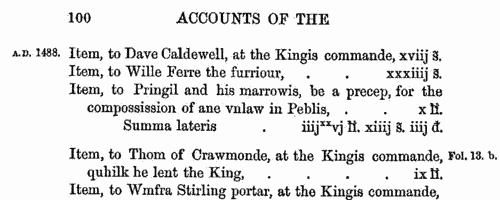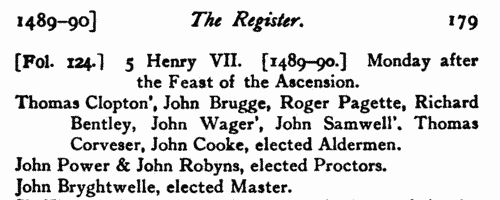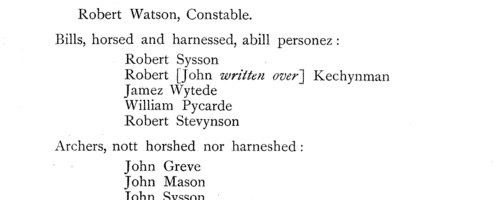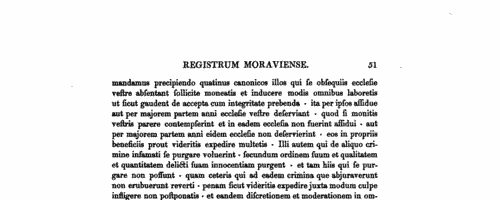Grant Surname Ancestry ResultsOur indexes 1000-1999 include entries for the spelling 'grant'. In the period you have requested, we have the following 2458 records (displaying 31 to 40): Single Surname Subscription | | | Buying all 2,458 results of this search individually would cost £14,272.00. But you can have free access to all 2,458 records for a year, to view, to save and print, for £100. Save £14,172.00. More... |
These sample scans are from the original record. You will get scans of the full pages or articles where the surname you searched for has been found. Your web browser may prevent the sample windows from opening; in this case please change your browser settings to allow pop-up windows from this site. Servants of the Scottish crown
(1473-1498)
Under the direction of the Lord Clerk Register of Scotland, the earliest Accounts of the Lord High Treasurer of Scotland, under the series Compota Thesauriorum Regum Scotorum, were abridged and published. This first volume, prepared by Thomas Dickson, curator of the Historical Department of the General Register House, was published in 1877. It contains the earliest surving accounts, from 1473 to 1474 in the reign of king James III, and the next, from 1488 to 1489 in the reign of king James IV. These were printed verbatim; but there then follow (page 166 onwards) accounts through to 1498 'considerably curtailed by the omission of unimportant entries'. These accounts are mostly lists of royal expenditure: many purchases of items for the court do not give the name of the merchants from whom they were bought, so the bulk of the personal names in the text are those of intermediaries, messengers, and various servants of the king.GRANT. Cost: £4.00.  | Sample scan, click to enlarge

| Inhabitants of Stratford upon Avon in Warwickshire
(1406-1535)
The Hospital of the Holy Cross was founded in 1269; in time this fraternity became a social and religious gild. 'The Register of the Gild of the Holy Cross, the Blessed Mary and St John the Baptist of Stratford-upon-Avon' was edited by J. Harvey Bloom, rector of Whitchurch, and printed in 1907. The register is a record of admissions to the gild, an account of the fines paid by new members, and the names of those in arrear. Each year's record usually starts on the Monday after Ascension Day (the sixth Thursday after Easter), when the new aldermen, master and proctors of the gild were elected, all duly named. Then follow the admissions to the gild, including payments for prayers and candles (lights) for the faithful dead; and the names of the sureties for these payments. Interspersed with this are occasional proclamations and memoranda concerning the fraternity. A peculiarity of this publication is that the years given at the head of each page (e. g. 1502-3) are those of the regnal year (in that case 18 Henry VII) in which the Monday after Ascension Day fell. The regnal years of Henry IV, Henry VI, Richard III and Henry VII all started after that day in the calendars of 1399, 1422, 1483 and 1485; so the gild registers during those years actually cover the following year to that shown in this printed text (in that case, 1503-4).
GRANT. Cost: £4.00.  | Sample scan, click to enlarge

| Wothersome Billmen
(1539)
In anticipation of war with France, Henry VIII ordered a general muster of able-bodied men throughout the kingdom. That for the wapentake of Skyrack, in the West Riding of Yorkshire, took place at Wike (near Leeds) before sir William Gascoigne the elder, sir William Middleton and sir William Maleverer, on 26 March 1539. Skyrack wapentake consisted of the ancient parishes of Aberford, Adel, Bardsey, Barwick in Elmet, Bingley, Collingham, Garforth, Guiseley, Harewood, (part of) Ilkley, Kippax, Otley, Swillington and Thorner, as well as the borough of Leeds. This muster roll listing the archers, billmen and spearmen of the wapentake by township or constablewick, was preserved among the State Papers in the Public Record Office; it was edited by W. Paley Baildon, and printed in three issues of the Miscellanea of the Thoresby Society (volumes 4 and 9) through to 1899. For each township there is a list of archers, divided into those fully and those partly ('parcel') armoured ('harnessed'), and a similar list of billmen; a few spearmen also appear. The weapon of the billmen - the bill or halberd - was a blade with a long wooden handle, sometimes with a hook with a cutting edge added at one side.
GRANT. Cost: £6.00.  | Sample scan, click to enlarge

| Clergy and benefactors of the bishopric of Moray
(1250-1540)
The mediaeval diocese of Moray comprised the shire of Elgin and Forres (or Moray), Nairnshire, and a large part of the shires of Inverness and Banff, in the sheriffdom of Elgin and Forres (Moray). The cathedral was attacked and burned by the Wolf of Badenoch (Alexander earl of Buchan and lord of Badenoch): but about 1400 an attempt was made to piece together surviving archives into a bishop's register. The Liber Episcopi contains the canons and constitution of the church, and charters relating to episcopal privileges and properties; the Liber Decani is the dean and chapter register. A fair copy of these records, plus later charters and writs, was made in 1540 and is called the Red Book of the Church of Moray. These manuscripts, together with other material to as late as 1623, were collated for the Bannatyne Club and printed in 1837. GRANT. Cost: £4.00.  | Sample scan, click to enlarge

| Tenants, founders and incumbents of Yorkshire chantries
(1546-1548)
Chantries were established to perform services for the souls of their founders and other faithful dead, including annual obits and anniversaries at which alms were usually distributed. The chantries could be at an existing altar in a parish church, a new altar in a side chapel of an existing church, in a new chapel in the churchyard or some miles from an existing church: few were founded before 1300, and most date from 1450 to 1500. Hospitals were places provided by similar foundations to receive the poor and weak; there were also religious guilds, brotherhoods and fraternities, and colleges (like large chantries at which three or more secular priests lived in common). An Act of Parliament of 1545 gave king Henry VIII the power to dissolve such chantries, chapels, &c., the proceeds to be devoted to the expenses of the wars in France and Scotland. Commissioners were appointed 14 February 1546 to survey the chantries and seize their property, and from 1546 to 1548 the commissioners produced these certificates giving brief details of the establishment and nature of each foundation, with an inventory of valuables and rental of lands. The individuals named in the certificates are thus the founder, the present incumbent, and the tenants whose rents provided the chantry's income. All the surviving certificates were edited by William Page for the Surtees Society, and published from 1892.GRANT. Cost: £6.00.  | Sample scan, click to enlarge

| London and Middlesex Feet of Fines
(1485-1569)
Pedes Finium - law suits, or pretended suits, putting on record the ownership of land in London and Middlesex.GRANT. Cost: £4.00.  | Sample scan, click to enlarge

| Scottish litigants, rebels and cautioners
(1545-1569)
The Privy Council of Scotland exercised a superior judicial authority in the kingdom, and consequently received and dealt with a constant stream of petitions, as well as dealing with the internal security of the state. This register of the council from June 1545 to July 1569, in the reigns of Mary queen of Scots and king James VI, was edited by John Hill Burton, Historiographer Royal for Scotland, and published under the direction of the Lord Clerk Register of Scotland in 1877. Some of the individuals mentioned are the complainants, those of whom they complained, and the sureties on both sides: at this period, some of the complainants are alleging serious attacks, often of a feuding nature. Many of the bonds entered into by the cautioners are promises to keep the peace towards such enemies. Failure to answer to the council when summoned was a serious contempt, leading to being denounced a rebel, with serious consequences. But 'horning' was also used in the pursuit of debts: there was no imprisonment for debt in Scotland, but a creditor could have an obstinate debtor ordered, in the sovereign's name, to pay what was due, failing which, the debtor could be put to the horn, denounced as a rebel, and imprisoned as a rebel. In his preface to this volume, Burton remarked that "There might perhaps be objections to the abundance of names of persons and places unknown to fame; but it was considered that in such a work the proper names of all persons and places occurring in the Register should be preserved, to be at the service of genealogical as well as historical investigators".
GRANT. Cost: £4.00.  | Sample scan, click to enlarge

| Scottish litigants, rebels and cautioners
(1569-1578)
The Privy Council of Scotland exercised a superior judicial authority in the kingdom, and consequently received and dealt with a constant stream of petitions, as well as dealing with the internal security of the state. This register of the council from July 1569 to June 1578, in the reign of king James VI, was edited by John Hill Burton, Historiographer Royal for Scotland, and published under the direction of the Lord Clerk Register of Scotland in 1878. Some of the individuals mentioned are the complainants, those of whom they complained, and the sureties on both sides: at this period, some of the complainants are alleging serious attacks, often of a feuding nature. Many of the bonds entered into by the cautioners are promises to keep the peace towards such enemies. Failure to answer to the council when summoned was a serious contempt, leading to being denounced a rebel, with serious consequences. But 'horning' was also used in the pursuit of debts: there was no imprisonment for debt in Scotland, but a creditor could have an obstinate debtor ordered, in the sovereign's name, to pay what was due, failing which, the debtor could be put to the horn, denounced as a rebel, and imprisoned as a rebel.
GRANT. Cost: £4.00.  | Sample scan, click to enlarge

| Scottish litigants, rebels and cautioners: excluded names
(1569-1578)
The Privy Council of Scotland exercised a superior judicial authority in the kingdom, and consequently received and dealt with a constant stream of petitions, as well as dealing with the internal security of the state. This register of the council from July 1569 to June 1578, in the reign of king James VI, was edited by John Hill Burton, Historiographer Royal for Scotland, and published under the direction of the Lord Clerk Register of Scotland in 1878. Some of the individuals mentioned are the complainants, those of whom they complained, and the sureties on both sides: at this period, some of the complainants are alleging serious attacks, often of a feuding nature. Many of the bonds entered into by the cautioners are promises to keep the peace towards such enemies. Failure to answer to the council when summoned was a serious contempt, leading to being denounced a rebel, with serious consequences. But 'horning' was also used in the pursuit of debts: there was no imprisonment for debt in Scotland, but a creditor could have an obstinate debtor ordered, in the sovereign's name, to pay what was due, failing which, the debtor could be put to the horn, denounced as a rebel, and imprisoned as a rebel. In his preface to the first volume, Burton remarked that "There might perhaps be objections to the abundance of names of persons and places unknown to fame; but it was considered that in such a work the proper names of all persons and places occurring in the Register should be preserved, to be at the service of genealogical as well as historical investigators". But by this, second, volume, he decided that complete coverage was impractical, with "the crowding in of proper names, all but a few being the names of obscure persons ... Borderers are called up in considerable groups, and ordered to find, or recorded as having found, sureties for giving compensation to persons plundered, or for good conduct for the future. Several burgesses are sometimes entered in a minute about a Corporation quarrel. When the particulars of unimportant private litigations are omitted, the names remain." He therefore devised this 'Index of Names excluded from the Text', giving name, conditions, and date in register.
GRANT. Cost: £4.00.  | Sample scan, click to enlarge

| Scottish litigants, rebels and cautioners
(1578-1585)
The Privy Council of Scotland exercised a superior judicial authority in the kingdom, and consequently received and dealt with a constant stream of petitions, as well as dealing with the internal security of the state. This register of the council from 17 June 1578 to 31 July 1585, in the reign of king James VI, was edited by David Masson, and published under the direction of the Lord Clerk Register of Scotland in 1880. Some of the individuals mentioned are the complainants, those of whom they complained, and the sureties on both sides: at this period, some of the complainants are alleging serious attacks, often of a feuding nature. Many of the bonds entered into by the cautioners are promises to keep the peace towards such enemies. Failure to answer to the council when summoned was a serious contempt, leading to being denounced a rebel, with serious consequences. But 'horning' was also used in the pursuit of debts: there was no imprisonment for debt in Scotland, but a creditor could have an obstinate debtor ordered, in the sovereign's name, to pay what was due, failing which, the debtor could be put to the horn, denounced as a rebel, and imprisoned as a rebel. The main text (to page 762) is from the Acta Secreti Concilii, containing the minutes of the Privy Council, and of occasional Conventions of the Estates. After that are printed some miscellaneous Privy Council documents from the same years. The sources most productive of names, the Acta Cautionis and Registration of Bands, are also the most repetitive in form, and are not transcribed verbatim and literatim: nevertheless, one of the editor's rules was for 'All proper names and names of places occurring in the originals to be preserved in the abstracts without exception, and in the exact original spelling.'
GRANT. Cost: £4.00.  | Sample scan, click to enlarge

|
Research your ancestry, family history, genealogy and one-name study by direct access to original records and archives indexed by surname.
|












